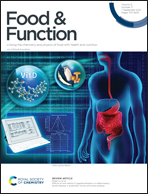Effects of oral vitamin D supplementation on inflammatory bowel disease: a systematic review and meta-analysis†
Abstract
Vitamin D (VitD) is a fat-soluble micronutrient that plays a critical role in inflammatory bowel disease (IBD). Although the effective properties of VitD in anti-inflammatory and immune moderation were reviewed, some important issues still remain uncovered. Considering the practicability and high bioavailability, as a more recommended therapeutic approach, the effects of oral VitD supplementation on IBD remain inconclusive. This study aims to investigate the effect and safety of oral VitD supplementation on IBD patients, which has already been registered on PROSPERO (no. CRD42020165045). A pooled analysis of 17 trials with 1127 patients revealed that as a safety therapeutic strategy, oral VitD supplementation effectively increased the concentration of serum 25-hydroxyvitamin D [weighted mean difference 12.15 ng mL−1; 95% confidence interval (CI) 9.26, 15.03; I2 = 90%] and decreased serum C-reactive protein levels [standard mean difference (SMD) −0.33; 95% CI −0.61, −0.05; I2 = 55%], but it did not decrease erythrocyte sedimentation rate levels (SMD 0.35; 95% CI −4.33, 5.03; I2 = 57%), disease activity index (SMD −0.13; 95% CI −0.66, 0.39; I2 = 84%) and relapse rate (RR 0.59; 95% CI 0.19, 1.86; I2 = 79%). These findings suggest that oral VitD supplementation has a role to play in the therapeutic management of IBD. These findings may contribute to public health and clinical dietary guidelines and improve the health of IBD patients.



 Please wait while we load your content...
Please wait while we load your content...